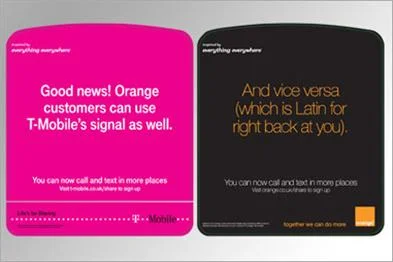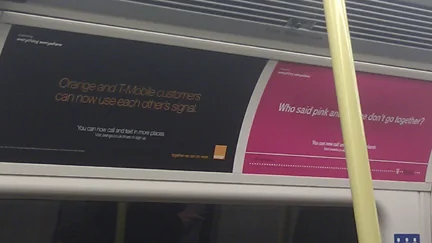A couple of days ago I spotted these Orange & T-Mobile ads on the tube.
Sorry it's not a very good picture. Taking photos of adverts on the tube is a bit weird anyway, even without pushing past people to get a better shot.
As I understand it, Orange and T-Mobile are using their mobile networks together to support each other's customers. The ad concept basically is that an Orange and T-Mobile advert are placed side-by-side. They collaborate as part of the same execution, but each within their own brand guidelines - like the symbol for yin yang. The consumer reads, 'teamwork', 'togetherness', 'sharing', 'harmony', or whatever.
Tracey Stern spotted it too; here's a clearer illustration lifted from her post:

Tracey's concern was that the novel offering seems to have been broadcast to customers at a surprisingly low level. I guess that may be true, but what occurred to me about this is something different.
I'm sure more and more we're seeing ad concepts that rely on consumers' consciousness of marketing itself. I think that's fascinating. Hasn't there traditionally been a rule in advertising - "Ssshh! Don't let them realise they're being marketed to!" - where consumers ought not to feel like we're being sold to? Brands should offer honest advice, good value, or expert knowledge... but never clever marketing!
I suppose that rule is born out of the sensible assumption that consumers don't want to pay for marketing; we want to pay for a product. But are things changing? Especially with the growth of new mediums, we're seeing more stuff being given away for free - music, games, services - but being bundled with and supported by advertising; and with on-demand television and a million cable TV channels, we've seen traditional advertising methods undermined in favour of increased "product placement". Advertising is becoming prominent as part of the products we consume, and so perhaps there's no use pretending any more: consumers recognise even the most subtle advertising, we know how it works, and that it's essential - and that can be a new 'hook' for marketers.
Of course, I'm acutely aware that perhaps it's just me. I'm hardly a sound judge on this question, when I work in marketing myself. I feel convinced that there must be lots of other recent examples of what I'm talking about, but actually the only one that springs to mind right now is the Google one I mentioned in a previous post, and that one was aimed at marketing professionals anyway! I wonder if I'm imagining things?
